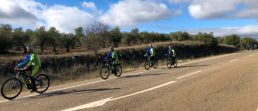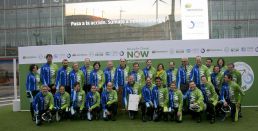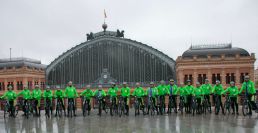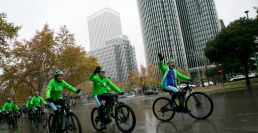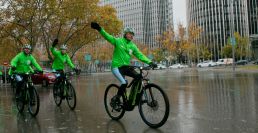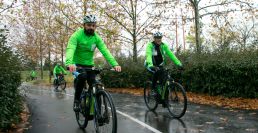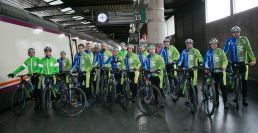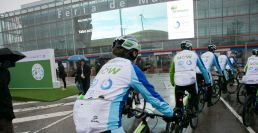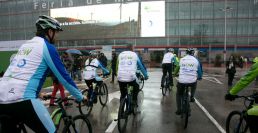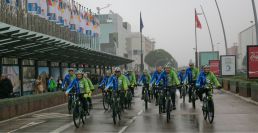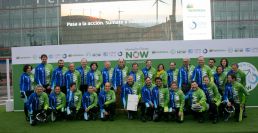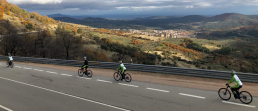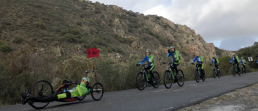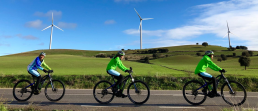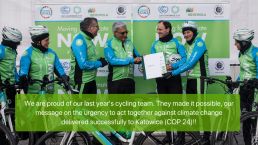Stage 5: our message is approaching Madrid!
Stage 5: our message is approaching Madrid!
Today our message has crossed to Castilla – La Mancha, in a route where the straights and flats of this region have dominated our ride to Toledo. Here we have been joined by the President of the Autonomous Community of Castilla – La Mancha, before venturing into the old town to explore all the historic and artistic richness of this Unesco World Heritage City.
Toledo is a very special city. History, art, heritage, culture, cuisine, and craftsmanship are all combined in Toledo. Churches, synagogues and mosques live side-by-side in the City of Three Cultures, where three great religions – Christianity, Judaism and Islam – have left their mark. All styles come together in this city: Arabesque, Mudejar, Gothic, Renaissance, which make the artistic value of Toledo incalculable.
Toledo serves as inspiration on how important different ideas and backgrounds need to come together in the fight against climate change. Those of us that have joined the Moving for Climate NOW initiative come from various countries and organisations. It should not be strange to have different opinions about some aspects of the policies to be implemented. However, we are aware that given the seriousness of the situation, we have to concentrate on JOINING and MULTIPLYING forces to mobilise society all around the world to achieve the 1.5oC target. Debate should not delay action. Society as a whole has to be mobilised and we need all on board.
Tackling climate change will require a laser-like focus on reducing global emissions. For this, we think the world needs a grand coalition that covers governments, investors, energy companies and everyone who is genuinely committed to taking on this challenge.Paul Simons - International Energy Agency (IEA)
Many countries are interested in how international carbon markets can help them achieve and enhance their climate mitigation goals. The IEA and the OECD, help governments advance the discussions on markets under Article 6 of the Paris Agreement through technical analysis and by promoting dialogue to enhance understanding of key issues. An agreement on this at COP25 is important to complete the Paris Agreement implementation rulebook.Luca Lo Re - International Energy Agency (IEA)
We come from a world of transactional relationships between agents ("I give, you give me"), and we have to evolve into truly transformative relationships, where we all put, we all take risks, we share benefits, and we all aim at a higher goal, the transformation. Alliances are the new institutional infrastructures that we need to address complex problems that, today, do not have a possible technical solution through conventional projects.Carlos Mataix, Polytechnic University of Madrid
Stage 6: arrived to COP25 with success!
Stage 6: arrived to COP25 with success!
The final day is here – we have arrived at COP25, whose motto, time for action, invites us to increase climate ambition. The goal has been reached and the experiences we have shared together along the 500 km route since Salamanca will always remain in our memory and will give us energy to continue working to fight climate change.
Difficult? Maybe, but not imposible. Very fews things that are important are easy. We won´t be lowering our defences – we´ll always be looking foward, because the struggle agains climate change is replete with obstacles that together we must overcome.
COP25 IT´S TIME FOR ACTION
Moving for Climate NOW!
Stage 4: completed our hardest stage to beautiful Guadalupe!
Stage 4: completed our hardest stage to beautiful Guadalupe!
Today we have completed a really special stage that has allowed us to connect two spectacular cities of Extremadura, from Trujillo to Guadalupe, where we have seen the magnificent Royal Monastery of Santa María de Guadalupe, an important pilgrimage centre in the Iberian Peninsula.
But it has also been the “queen stage” of our trip with an overall cumulative difference of some 1,000 metres. From km 30 there has been no let up, and the succession of ups and downs has dominated, until the last few kilometres, now with the city of Guadalupe in sight, which have been downhill.
The stage of today, with its ups and final downhill could be a good symbol of the pathway we are going through to achieve decarbonisation of the economy. The road in the fight against climate change is full with obstacles, but we learn by doing and move with collective effort. Now, technological progress is on the side of climate, with clean energies (renewables, energy storage, mobility, etc.) undergoing a deep technological revolution, which can spur competitive and cost-effective solutions to drastically reduce emissions. We have the tools to deliver the energy transition, but, with energy-related emissions continuing to grow, we still have a long way to go. We need to implement smart policies and use all the levers (financing, circular economy, etc.) to give the right signals to accelerate their deployment and change behaviours towards more sustainable consumption patterns aligned with our planet´s capacity. This transition will not only provide a solution to climate change, but it also brings opportunities in the form of economic stimulus, employment, lower air pollution and a better life today and for future generations.
The transition to a low carbon economy has a big potential for job creation. A paradigmatic example can be found in naval shipyards that have managed to reinvent themselves by constructing different components of offshore wind power plants. This search for novel, imaginative and synergistic solutions is crucial.Carlos Sallé Alonso - Iberdrola
When we look at what is needed to meet climate and other sustainable energy goals, energy efficiency and renewables are among the central pillars. But we also need many other technologies to play a part in decarbonising different sectors of the economy. There is no single or simple way to transform global energy systems.Paul Simons, International Energy Agency (IEA)
Decoupling economic growth and greenhouse gas emissions has never been more urgent if the world is to meet the climate objectives of the Paris Agreement. This requires concerted action on clean energy transitions. Governments are more and more interested in designing and implementing ambitious climate mitigation policies and carbon pricing instruments to steer their economies onto low-carbon paths. I’m proud to be part of the IEA’s work supporting these governments by providing data, analysis and technical solutions.Luca Lo Re - International Energy Agency (IEA)
Subsidizing fossil fuels means using hundreds of billions USD of tax-payers’ money to fund climate change and air pollution. This money could be re-invested in the energy transition. This needs to be addressed in climate negotiations.Lourdes Sanchez - IISD
A large-scale shift to renewable energy and electrification could deliver three-quarters of the needed reduction, or as much as 90% with ramped-up energy efficiency. This transition to a climate-proof energy system will not only provide a solution to climate change, but also provide socio-economic benefits, such as increased GDP, jobs, and human health.Claire Kiss - International Renewable Energy (IRENA)
Stage 3: with team effort we arrive to Trujillo!
Stage 3: with team effort we arrive to Trujillo!
In this stage we have united two of the cities with more personality of the province of Caceres. We left the capital and passed through small villages until we reached Trujillo, a monumental city with a very special charm.
The stage of just over 90 km has not been complicated, but there were a few ups and downs that challenged the resistance of the team. Precisely, the topic of discussion of the day was the importance of building climate resiliency and ensuring that this process is inclusive, so that no one is left behind.
We need to be aware that climate change is a serious ethical conflict that impacts mainly on the most disadvantaged sectors of the population and which is jeopardising the future of the coming generations. Policies need to address these vulnerabilities first so that these sectors can adapt and cope with the changing climate patterns and also so that mitigation efforts do not aggravate their situation.
The planet has already warmed by 1°C above pre-industrial levels and under current rates we are expected to breach 1.5°C between 2030-2052, according to the IPCC special report on global warming of 1.5°C. Whether and how we are able to limit temperature increase will greatly influence the resiliency of natural and human systems, which are already experiencing the impacts of the multiple observed changes in the climate system. If we fail to take action now, the irreversibility of the situation will mean that any future measures will be ineffective and much more expensive.
The best solutions of adaptation strategies to climate change will be born from the scientific endeavor to better understand the climate and social system. However, collaboration among scientists, decision-makers and stakeholders will be mandatory to properly focus the efforts of the former, and to successfully implement the strategies constructed among all of them.Manuel del Jesus - Instituto de Hidráulica Ambiental de la Universidad de Cantabria (IHCantabria)
We need to focus on Inclusion and accessibility when developing climate resilience. Remote, rural and poverty-laden communities are the most vulnerable to climate change but often have the least amount of access to technological advances.Anurag Saha Roy - Wikilimo; United Nations Competition Summer of Solutions Winner
Moving towards a greener economy is creating opportunities for new technologies, investment and jobs. At the same time, environmental change and in particular climate change has detrimental effects on certain economic sectors and can cause job losses. Identifying and providing the right skills for new and existing jobs can smooth transitions to greener economies and ensure that new opportunities benefit a broader share of society.Jorge Cattaneo - Ayuda en Acción
Climate change & inequities are linked: 1)most vulnerable people are experiencing the worst impacts of climate change 2)climate change is affecting the most in Global South countries, the poorer 3)inequity is intergenerational, our youth will be the most affected by our NO action.Fernando Mudarra - Ayuda en Acción
Stage 2: breathtaking views as we cross the National Park of Monfragüe!
Stage 2: breathtaking views as we cross the National Park of Monfragüe!
We leave Castille-León, because the second stage takes us to Extremadura. The journey to the UNESCO World Heritage City of Caceres, final stop of this stage, was long but beautiful. Nature has been the main feature as we have crossed the spectacular Jerte valley, famous for its cherries and the beautiful Monfragüe National Park, where some surprised deer have witnessed our peloton.
Today we have traveled a longer distance than yesterday, 107 km, which gave us time to reflect on the importance of engaging society in climate action and on the best ways to communicate this problem. The general public and social organisations should implement the values and habits that are crucial to solve the climatic emergency we are in. Each individual has a key role to play as it is the sum of millions of small actions what makes a difference. But how do we involve all stakeholders in climate action? Drivers that promote a change in social behaviour (education, awareness, communication), are as essential as good policies to achieve exponential solutions.
I think those at COP25 would do well in having children in mind when overwhelmed by the complexity of the solution. When I explained my 5-year-old twins why the planet is warming up, they had no doubt: “if we know it is because we are polluting, let’s just stop polluting.Adela Conchado - Far&Sound
The population is aware of climate change, but does not know how to act. We urgently need to change habits in our everyday life. As leaders, we must provide citizens with tools and example to help them in this challenge. Each gesture, however small, counts.Elena Moreno Zaldibar - Basque Government
Times have changed: society and youth worry about climate change and are asking governments to act. But finding solutions is not always easy. We, experts, are best placed to help bridging gaps and finding solutions.Lourdes Sanchez - IISD
Education is the start of the conversion to a civilization more respectful with the people and with the planet. And education starts in childhood, but does not end until the end of our lives.Susana Lagüera López - University of Salamanca
Stage 1: Salamanca and their students wish us good luck!
Stage 1: Salamanca and their students wish us good luck!
We are finally on the road towards Madrid for COP25! And we have started pedalling in Salamanca, a city marked by the richness of its heritage and culture and home to one of the oldest and most prestigious universities in the world, which has just celebrated its 8th centenary.
By departing from Salamanca we want to put youth in the spotlight of climate action. The future is theirs and bringing youth and experienced people closer and facilitating intergenerational dialogue has to be the key. Conveying hope and action for the environment by involving those who will shortly be its main players. A climate generation that wishes to show the world that it is united in climate action.
We have started our trip in the University, where we have been welcomed by its Rector and joined by a group of students and teachers, before arriving to the monumental Plaza Mayor, where the local authorities have gathered to wish us a good trip, and support our cycling expedition for climate action. From there we have cycled to another historical city, Ávila, where we have bordered its amazing city wall, following the same route that makes the professional cycling competition Tour of Spain.
And under this incomparable framework we have talked about the importance of limiting the increase in global temperature to below 1.5 ºC. This is equivalent to reaching global net-zero CO2 around 2050.
The challenge is huge and there is no time to waste. Global average temperature is already about 1°C higher than the pre-industrial period and this increase has happened over just a few decades. Moreover, since the industrial revolution, we have seen a rise in the concentration levels of greenhouse gases not experienced for over 650,000 years.
And the forecasts are not better, if all countries deliver on their current climate pledges, the world will likely experience a 2.9 to 3.4°C average temperature increase. Inaction could cause warming of over 4.5°C with devastating consequences.
But at the same time, addressing climate change is also about building resilience and hope. It is also a huge opportunity, not only by avoiding the impact of climate change, but also because it brings economic stimulus, employment, lower air pollution and a better life today and for future generations.
Many of us don’t realise that the 1.5° rise isn’t when things go wrong and the planet gets on fire. Earth is already on fire, but we can still save some of it. Beyond the 1.5° goal, there is no looking back.Anurag Saha Roy -Wikilimo; United Nations Competition Summer of Solutions Winner
Climate change is a reality and we already have it here. Scientists say that we are not aligned with a path that allows compliance with the Paris agreement. Climate change generates exponential problems that require exponential solutions.Carlos Sallé Alonso - Iberdrola
A significant acceleration of the global energy transformation is needed as energy-related CO2 emissions are rising. Policymakers must take swift and decisive action.Claire Kiss - International Renewable Energy (IRENA)
The future will be what we decide to do with it. Nothing is already written.Álvaro Rodríguez - Climate Reality Project General Coordinator in Spain
Getting ready for tomorrow!
Ready, steady…GO! The fifth edition of the Moving for Climate Now cycling route is just about to start towards the COP25 to be held in Madrid under the presidency of Chile.
Once again, Moving for Climate NOW will gather a climate committed multidisciplinary team from different organizations and countries (international institutions, governments, companies, universities, scientists, civil society, NGOs, etc.) to deliver a message on the importance of acting together against climate challenge with increased ambition and urgency.
This is the reason that gives meaning to our story. The journey of more than 500 km that we will start tomorrow is a sporting, environmental and collective challenge that seeks to raise awareness, to connect and bring people closer to some of the actions being taken to protect our planet and ensure that we limit global temperature increase to below 1.5°C.
Follow the day by day of our initiative through the web and Twitter!!
Meet us at… COP25
Go! The fifth edition of the Moving for Climate Now cycling route is here. UN Climate Change Conference (COP25) will be held from 2 to 13 December in Madrid (Spain) under the Presidency of Chile. This year is the 25th edition of the summit, whose slogan is Time to act, a call to all countries to scale up their commitments to fighting climate change.
As in previous editions, the objective is to deliver a message stressing the need for unity and immediate action against climate change, promoting the transition towards a more efficient energy model that eliminates CO2 emissions. Every year, the cycling route is combined with discussion sessions on specific themes. Thus, as well as pedalling, participants reflect on the different aspects of the climate challenge.
Click here to see the details of the previous editions.
Don’t lose sight of us!
Moving for Climate NOW recognised as the best awareness initiative by the #ClimateLeadersAwards 2019
https://youtu.be/335xKhryhfg
Moving for Climate NOW has been recognised as the best awareness initiative at the Climate Leaders Award organized by the Climate Reality Project, a non-profit organization involved in the education and advocacy related to climate change. The initiative was founded in 2006 by former US Vice President and Nobel Peace Prize winner, Al Gore. The aim of the Climate Leaders Awards is to put the fight against climate change at the forefront of the social and political agenda. The awards recognise Spain’s most effective advocates in the fight against global warming.
The Climate Reality Project has more than 230 climate leaders in Spain and more than 18,000 worldwide, formed by Al Gore. Through conferences, climate leaders help explain what climate change is and the urgency of acting to stop it.
Thanks to all the people who have made this initiative possible, which will soon begin its fifth edition, at COP25 in Madrid under the presidency of Chile.
We are proud of our last year's cycling team
The 24th Conference of the Parties to the United Nations Framework Convention on Climate Change took place in Katowice (Poland) last year. And so, this was the city where the Moving for Climate Now team delivered their Manifesto supporting climate action, after travelling more than 600 km in a 7 day route from Vienna.
The delivery of our Manifesto to Ovais Sarmad – the United Nations Climate Change Deputy Executive Secretary - and Jakub Gibek – the Head of Climate Policy Unit of the Minister of the Environment of Poland, was charged with emotion. And the moment that the entire cycling team looked forward to. After an exciting journey traveling more than 600 km, overcoming several hills and walking through natural trails and urban areas, with rain, storms, cold and accumulated fatigue, reaching the goal and fulfilling the delivery of the text, was amazing.
Now we are looking forward to our next climate awareness expedition, to promote joint and immediate climate action and sustainable behaviours. Because the fight against global warming must involve governments and organisations but also each one of us in our daily routine. Let’s get moving for climate together.
Let’s get Moving for Climate Now!!

